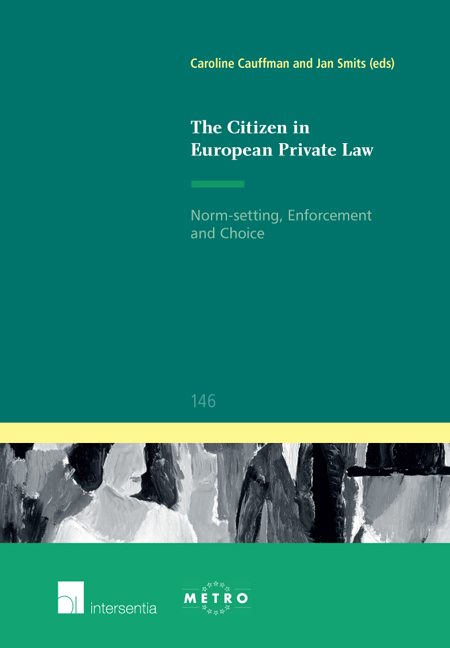Book contents
- Frontmatter
- Contents
- List of Authors
- List of Abbreviations
- Preface
- Introduction
- Part I Choice and Regulatory Competition
- Choice and Regulatory Competition. Rules on Choice of Law and Forum
- Party Autonomy in International Family Relationships: A Research Agenda
- Corporate Mobility in the European Union – A Flash in the Pan? An Empirical Study on the Success of Lawmaking and Regulatory Competition
- Corporate Mobility in the European Union – An Analysis of Ringe's Empirical Research on the Success of Law Making and Regulatory Competition
- Part II Norm-Setting and Enforcement
- Ius Commune Europaeum
Choice and Regulatory Competition. Rules on Choice of Law and Forum
from Part I - Choice and Regulatory Competition
Published online by Cambridge University Press: 21 September 2018
- Frontmatter
- Contents
- List of Authors
- List of Abbreviations
- Preface
- Introduction
- Part I Choice and Regulatory Competition
- Choice and Regulatory Competition. Rules on Choice of Law and Forum
- Party Autonomy in International Family Relationships: A Research Agenda
- Corporate Mobility in the European Union – A Flash in the Pan? An Empirical Study on the Success of Lawmaking and Regulatory Competition
- Corporate Mobility in the European Union – An Analysis of Ringe's Empirical Research on the Success of Law Making and Regulatory Competition
- Part II Norm-Setting and Enforcement
- Ius Commune Europaeum
Summary
Introduction: The Abstract and Peculiar Character of PIL
The field of private international law (hereinafter ‘PIL’) is known as an abstract and peculiar discipline. PIL could be considered peculiar because through the application of PIL a new dimension is added to the law: PIL is a field that determines whether, in private disputes with cross-border elements, a judge can hear a case according to rules of international jurisdiction and subsequently, according to the rules of applicable law, which law will be applied by this court. This entails that it may very well be the case that, considering the added value given by PIL rules, this will possibly make the solution of the case more difficult and complicated. However, the very fact that a new dimension is added to the law through the application of PIL may grant to private actors – both individuals and companies – additional legal options in which new additional strategies can be followed.
When we talk about options and strategies for individuals and companies – both types of private actors will be involved in this contribution – this contribution will essentially deal with the options or strategies concerning the right to address a certain judge (choice of forum) rather than another and the law that the judge should apply (the applicable law). Most attention will be given to the issue of the applicable law.
In this contribution I will explore in a non-exhaustive way some ongoing dynamics and focus on a number of issues relating to the possibilities to choose (the judge or law applicable) c.q. to ‘shop’ for private individuals and companies. I will briefly mention in this context a number of ‘hot issues’ in current politically sensitive topics, namely on labour law and Corporate Social Responsibility.
I shall focus on the rather indirect, sometimes almost hidden ways for actors – both private individuals and companies – to seek the application of a desired law.
The Two Basic Lessons of PIL, Placed in the Current Situation of Europeanisation of PIL
The highlighting of options concerning jurisdiction and applicable law leads to the essence of PIL: by highlighting the question of international jurisdiction and the question of applicable law, two of the three main issues of PIL are raised.
- Type
- Chapter
- Information
- The Citizen in European Private LawNorm-Setting, Enforcement and Choice, pp. 9 - 22Publisher: IntersentiaPrint publication year: 2016
- 1
- Cited by

